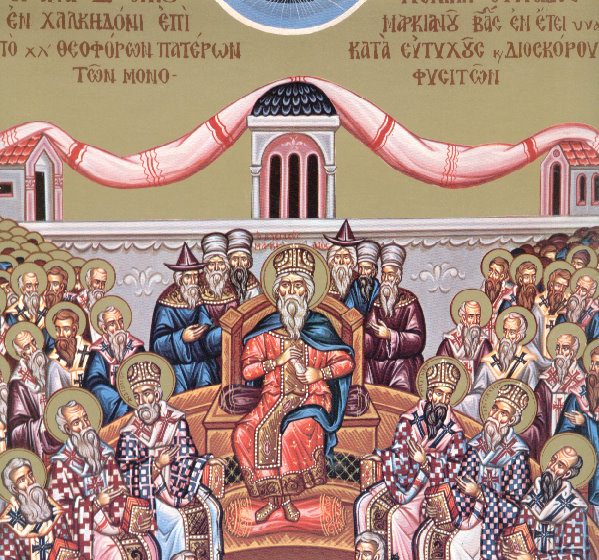
Sunday of the Holy Fathers of the 4th Ecumenical Council
Feast Day of all the great saints who have shone in Pisidia and Pamphylia
In our daily worship services we make repeated references to the Saints of our Church, with the All Holy Mother of Christ the Savior taking receiving first place. The Celebrant frequently exhorts: “Remembering our most holy, pure, blessed, glorious Lady Theotokos and ever virgin Mary, with all the saints …” In our common worship we commemorate the Saints and honor them with hymns and supplications, seeking their intercessions with God. This is done every day throughout the whole year. There are even days where thousands of Saints are honored, like today, when we celebrate the festal gathering (Synaxis) of more than 15,000 Saints of Pisidia and Pamphylia. This is done in addition to the commemoration of the 630 Holy Fathers of the Fourth Ecumenical Council of Chalcedon (in 451 A.D.).
As we know, the Saints in Heaven intercede for us in many wonderful ways, always willing to help us in our time of need. At the same time, the accounts of their lives and words have survived to the present day, reaffirming the possibility of living the Gospel at all times (contrary to what some might assert). If a person is willing to make the consistent effort, they can do likewise and make the Gospel the center of their lives, following the path of the Saints to holiness.
Let us examine more closely what it means to “be holy.”
In the Old as well as in the New Testament, the one who is called holy is God. “Holy, holy, holy, Lord God Almighty,” as the Angels sing in Heaven (Revelation 4:8). God is, ultimately, the Holy One, and the source of holiness. Those who freely desire communion with Him receive holiness in return. Without Christ the Savior, holiness is impossible, no matter how much a person sacrifices or how hard they try. This is why God calls every human being to come to Him, and be strengthened by His divine Grace, struggle to become holy: “Be holy, for I am holy” (1 Peter 1:16).
It for this exact reason that Almighty God established His Holy Church, so that, with His sanctifying Grace which comes from the Sacred Mysteries (and with other means), sanctity may come to those who believe. As we know, it is through Holy Baptism that a believer turns away from the devil and becomes a member of the Holy Church of Christ, uniting themselves with Christ the Savior. “As many of you as were baptized into Christ have put on Christ” (Galatians 3:27). So once a person rejects the evil one and embraces Christ, they belong to God, being called “saint” in the New Testament. That is why St. Paul the Apostle in his Epistles calls the Christians of specific cities, like Rome, Corinth etc. “saints”; for example, “To the church of God …with all the saints who are in all Achaia” (2 Corinthians 1:1).
However, Baptism in itself is not enough for someone to share in God’s holiness. A person must be an active member of the Church. This means remaining faithful to Orthodox doctrines, partaking of the Holy Sacraments (receiving holiness as a result), and striving to live the Gospel. The believer’s life has to be “a living sacrifice, holy, acceptable to God” (Romans 12:1). As we read in the Acts of the Apostles (11:26), that the people of the Church started being called “Christians” (which actually means “imitators of Christ,” and not just a believer).
This is why starting from the 2nd century, the term “Saint” was applied specifically to certain persons who had held a prominent place in the Church. The first to be declared as Saints were Martyrs of the faith. Also included in their number are those considered Confessors, those who had confessed their faith openly and for this were persecuted and tortured (but survived). After the persecutions, people who lived exceptional lives of holiness and faith that were nurtured by spiritual struggle, also came to be proclaimed as Saints (as well as those who offered exceptional service to the Church).
According to the centuries-old practice of the Church, the Saints are recognized after their sanctity has been revealed by God Himself. This comes through indisputable signs that are impeccable and beyond any doubt whatsoever. Such signs include miracles, which have taken place with the intercession of the Saint, while in life or after their dormition (or falling asleep). The state of their relics (including a characteristic fragrance) is also an indicator.
In the Orthodox Tradition, the recognition of Saints is the consciousness of the Church expressed by pastors and those under pastoral care alike. In more recent centuries, this general sentiment of the whole Church body is formally declared by a special decree of the Patriarchate.
My dear brothers and sisters, the Saints whom we honor today, as all the Saints of our Church, are urging us to constantly strive towards holiness, in imitation of their lives. In particular, this means a firm determination to love Christ, even if it means sacrificing our lives. “Having remembered All the Saints, let us commit ourselves, one another, and our whole life to Christ our God.” Amen.





